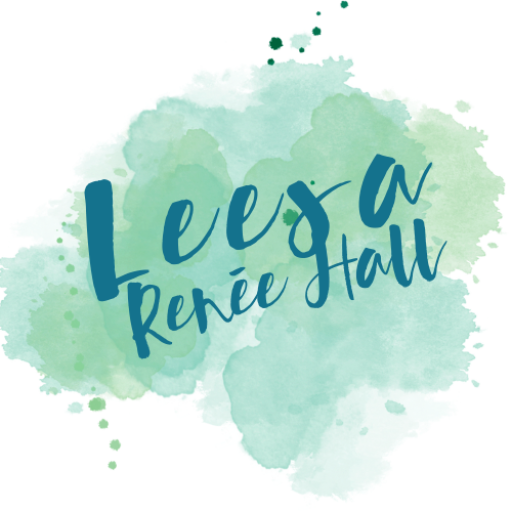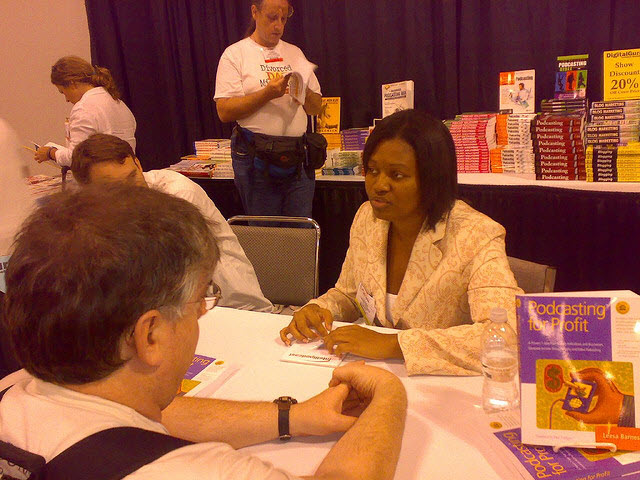I’m participating as a presenter in the 3rd (and final) ACCPOW Telesummit organized by Milana Leshinsky. It’s a fabulous event and brings together some really smart people who are coaches and consultants.
I was on a panel discussion with a few coaches and the one panelist who stood out was Ramon Williamson. Milana facilitated the discussion and when she asked Ramon what are the 3 tools he used to build traffic, he didn’t just talk about the tools, he talked about the strategy.
Ramon talked about collaboration and letting your clients co-create products with you. It was just amazing. Then he started to talk about RSS feeds and wikis and how these can help you to push out your content to a wide audience.
Some people just couldn’t understand all this techno mumbo-jumbo, but I was just totally amazed at Ramon advice.
He gave me a call right after the panel and in our 45-minute discussion, he shared with me the many problems he sees with podcasting. But the one thing he said to me that really stood out was this gem:
“Be disruptive,” he advised.
It’s similar to another quote I read the other day:
“Well behaved women are seldom remembered.”
Seth Godin had a blog post where he listed the many ways to be remarkable. One of his points stood out:
“Understand the urgency of the situation. Half-measures simply won’t do. The only way to grow is to abandon your strategy of doing what you did yesterday, but better. Commit.”
This podcasting thing is cool, but our focus as an industry is wrong. We tell people they have to podcast, then make it so darn hard to get a podcast out there.
We do this to make our services and skills relevant. Tell people all about RSS and blogs and make it sound so complicated that they have no choice but to hire us.
 People like blogging because it’s easy to do. People enjoy YouTube because it’s easy to do. People turn away from podcasting because it’s too technical, too hard and not worth the bother.
People like blogging because it’s easy to do. People enjoy YouTube because it’s easy to do. People turn away from podcasting because it’s too technical, too hard and not worth the bother.
I do many presentations on podcasting and I’ve learned to stay away from the “how” questions. In the 3 times I talked about the “how,” I got so many blank stares that even I stood back and said, “This is too complicated.” I would go home frustrated that only 3 people wanted to follow up with me afterwards simply because the “how” discussion scared the majority of the room off.
Measurement is another issue. For every 10 clients I have, 4 don’t bother with podcasting any longer because they can’t understand if the number of downloads or pageviews or feed requests or whatever is making their podcasts popular.
I tell them that a small audience is good and they should go for the long tail effect. But companies want result now, not 10-years from now. We will never get companies on board with this podcasting thing if we can’t show the ROI in more tangible ways.
The urgency here is that podcasting will reach its inflection point of not being relevant in 12-months if we as podcasting consultants don’t recognize that we need to speak people’s language in order to make this medium work.
Scott Bourne said it best on his blog as he commented on the long haul of podcasting. He said:
“We need to figure out a way to make RSS real to my 80-year old aunt.”
![]() Yes, exactly. RSS feeds? Who cares? Tell them how they’ll save money. Edit, mix & produce? Who cares? Tell them how they’ll get increased search engine traffic.
Yes, exactly. RSS feeds? Who cares? Tell them how they’ll save money. Edit, mix & produce? Who cares? Tell them how they’ll get increased search engine traffic.
We geek-speak people to death because we’re now suddenly popular. We’re using this space like it’s our personal fiefdom. We position podcasting to be so darn hard to implement because we’re finally part of this in crowd.
As geeks, we weren’t popular in high school (I was a jock, but it’s kind of similar). We enviously eyed the pretty girl, but could never get her because she thought we were too weird, too strange, too bizzare.
Now, because we “get” podcasting, all the pretty people are coming to us. We’re now cool and popular, so we hang on to the tools of the podcasting trade so we can hang on to this new status.
Finally, people want you. Finally, people want to be around you. So you speak in geek-speak just so you can continue to be needed and delight in seeing people’s brow farrow.
Get over yourself. Once you teach someone how to do something, they’ll do it themselves and you’re no longer relevant. I’ve had many clients and all have gone their own way because they “get it” and now teach others how to “get it” as well. Why hire Leesa to implement a podcasting strategy when I can now do it in my sleep?
Stop saying that podcasting is the death of radio and TV, because it’s not. No one will watch a 22-minute TV show on their iPod. Heck, it wasn’t until I bought my iPod last Christmas that I actually started to listen to my favourite podcasts more regularly.
 Podcasts are small breadcrumbs that will peak people’s interest. A 7-minute audiocast will be listened to more regularly on the go on a portable device. People who get this will reap the rewards in the podcasting field.
Podcasts are small breadcrumbs that will peak people’s interest. A 7-minute audiocast will be listened to more regularly on the go on a portable device. People who get this will reap the rewards in the podcasting field.
Yes, it was cool to download podcasts, but then, they would just sit there on my computer. And unfortunately, I use my computer to work, not to enjoy entertainment.
The computer on my desktop is a working machine, while portable devices are where entertainment lies. Sorry, but I find it difficult to listen or view podcasts when I have a proposal to write or a document to polish up.
Stop saying you don’t need an iPod to listen to podcasts. Start saying a portable device is necessary to enjoy them. Those who continue to say “You don’t need an iPod,” will become irrelevant.
Things are happening. I’ve had discussions with some interesting people over the past 2-weeks who are developing tools that will render half of the podcasting consultants out there obsolete.
We’re killing our own industry as podcasting consultants. The only way we can stop the bleeding is by combining our resources to find a way to make this darn thing easier to do. You’re editing podcasts, I’m editing podcasts, why? How silly. Develop a central clearing house and hire people offshore to edit these things.
Combine resources and build a platform that’ll make it easy for people to click on 2 buttons and voila! The podcast solution is live. I can start a blog in just 3 easy steps in under 5-minutes. I expect something similar for podcasting.
Focus on a niche market and more importantly, focus on a part of podcasting that you really love. I love to teach people how to turn listeners into clients. I love to teach people how to turn their vision into podcast content. If anyone wants to learn how to produce a podcast, I sent them to someone else.
Why do I do this? Well, I know that I can’t be relevant to everyone. So, I choose to be relevant to a small few and refer people to other consultants who are strong in the areas I’m weak.
Collaborate. Co-create. By doing this, you’re helping to increase the number of people who’ll be interested – and will actually produce – a podcast. Continue to treat podcasting as the best kept secret and you’ll be on your own when the industry moves forward.
Tags: podcasting, web 2.0, social media, marketing, blogging, technology, business


Wow, a blatant pitch in the comment section!
Okay sure, I’d be interested in sitting in on the webinar or teleclass – where do I find out the when/where? Thanks.
We’ve done a lot of work at Podcast Spot (http://www.podcastspot.com) on making the tools easy to use. You don’t have to understand the how. None of the tech stuff you mention as required for your hosting (http://podonomics.com/godaddy-hosting-officially-sucks/) is necessary. All you do is create a free account then click Add Episode. Pretty simple.
And we’re always working to make it easier. You should try it! Tell you what…sign up and use Podcast Spot for a month (we’ll give you however much free upload you need). Produce your podcasts like normal, but do a duplicate at your Podcast Spot account. I think you’ll be pleasantly surprised at how well it works! Not only is it easy, but you get media conversion, BitTorrent seeding, and a bunch of other cool features all included.
You said: “I can start a blog in just 3 easy steps in under 5-minutes. I expect something similar for podcasting.”
Podcast Spot is that solution for podcasting. Try it for yourself and I think you’ll agree!
How I (or any consultant) describe podcasting to the lay person isn’t the problem. Take a look at these testimonials as proof – http://tinyurl.com/35vpuz
The problem isn’t how we communicate podcasting, the problem lies with the tools. They’re scattered, complicated, frustrating. And as a podcasting consultant, describing the “how” to anyone proves to be the deal killer.
You know what? I invite you to sit with me in my next presentation on podcasting. If you’re in Toronto, come with me to my next presentation. If you’re not, sit in on the webinar or teleclass I conduct. You’ll see exactly what I mean.
Umm, no, not kidding you. Maybe I am not understanding what you’re getting at. You mean to tell me that podcasting will become irrelevant in January 2008 if consultants don’t change the language they use?
No offense, but podcasting isn’t going anywhere, regardless of the changes you plan to make to your communications.
You’ve been disruptive, Leesa.
I, for one, can’t wait for that device that makes podcasting dead easy. Even if it puts me out of a job.
You’re kidding me, right?
“The urgency here is that podcasting will reach its inflection point of not being relevant in 12-months if we as podcasting consultants don’t recognize that we need to speak people’s language in order to make this medium work.”
Where did you get that number, 12 months? Seems like you picked it out of the air.